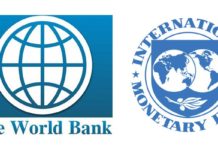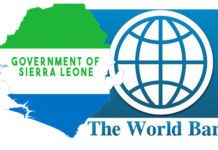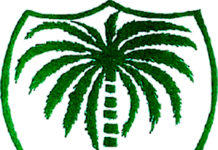

By Mahmud Tim Kargbo
Informed observers and commentators on the Sierra Leonean socio-economic and political terrain, indigenous and foreign, all agree on one fact regarding the swift collapse of the national economy after late President Ahmad Tejan Kabba left– Sierra Leone’s economic depression is policy-induced! It certainly is not by accident that a country of few million dynamic and hardworking people, that had successfully begun to diversify itself from a uni-product economy to one hinged on diverse sources suddenly awakes to find its fortunes violently depleted and reversed, with the supervisors of the national economy each passing day churning more regulations geared towards causing more harm and creating more confusion domestically and causing disinterest from genuine foreign investors.
In their quest for legitimacy, democratic regimes in Sierra Leone, after the late Ahmad Tejan Kabbah, find themselves having to balance two values that can be in some tension: fair and non-politically partisan public service delivery and, subject to the law, the responsiveness of public servants to the policies of the past Koroma and current Bio executives.
Neutrality in the sense of political non-partisanship in public administration is, of course, a precondition for ensuring that, regardless of their political orientation, citizens are treated fairly and in an equitable manner. Operationally, it is delivered by emphasising professionalism, merit and competence amongst public servants. These values are important to the level of justice and continuity in public administration – arguably a significant determinant of how much trust citizens place in their system of government. At the same time, public servants must be accountable to the government for the effective delivery of its programme, and responsiveness of the administration to the government of the day within the law and the constitution is key to the effective implementation of our government policies. As stated in the Principles of Civil Service Code In Sierra Leone:
(e) “Impartiality”
(i) “Justice, fairness, equity and impartiality are the prime values of the Civil Service. Therefore, in carrying out public business, Civil Servants shall not display partiality as a result of personal or family ties or of gender, religion, region or ethnic background. They shall treat all people fairly, in making appointments, awarding contracts, or recommending individuals for rewards, promotions and other benefits and shall make choices based solely on merits”.
The Civil Service Act depicts how Sierra Leone developed institutional arrangements that balance these two concerns to avoid the extremes of a self-serving public service immune to political leadership or an over-politicised public service hostage to patronage and serving partisan, regional, tribal rather than national interests. With this in mind, I investigate past, and current secrete and open appointments to mainstream public service managerial positions by the Koroma and Bio governments. Other than for some occasional comparisons, my investigation does not consider the appointment of political advisors outside of the usual public service hierarchy.
The tensions between the values of neutrality and responsiveness are not at all evident in the past and current recruitment and appointment actions of the APC and SLPP governments. Political responsiveness can be enhanced by selecting staff on the basis of both merit and commitment to a particular policy programme. The question is whether those staff would just as willingly assist in the implementation of the policy priorities of a new government and the next, especially when they aren’t going through the “Regrading Committee” of the Civil Service.
My investigations unearth that, for the past and current APC and SLPP governments, political involvement in administration is essential for the proper functioning of a democracy. According to my sources, their incoming political administration would find itself unable to change policy direction without this. However, we are again experiencing a government that is deliberately ignoring the reality that public services need protection against being misused for partisan purposes, they need technical capacity which survives changes of government, and they need protection against being used to impair the capacity of future governments to govern. This was clearly stated in our Civil Service Act under Recruitment and Appointment;
Rule 2.1:
In principle, unless the commission directs otherwise, all vacancies shall be fully advertised by appropriate notice within the Civil Service or through the Gazette, the press, other media, employment exchanges, or other appropriate means for the information of the general public. There must be a reasonable period of time, with a minimum period of one month, between the date of advertisement and the deadline for applications to be received.
Rule 2.5(d) selection procedures must be reliable and guard against bias, and equality of opportunity must apply throughout the recruitment process.
Put starkly, when there are multiple principles, the single political principle with some responsibility for the sector portfolio (Ministers, Permanent Secretaries etc.) faces a distinctive incentive for politicisation as it gives them a stronger handle on an otherwise unresponsive bureaucracy. This conclusion argues against the assumption that underpins much public management literature, which warns about the negative effects of political involvement and often suggests that purely administrative determination of staffing decisions is the preferred state and that any steps down the path of political involvement are intrinsically damaging to governance. This was what late President Tejan Kabba believed and succeeded in building Sierra Leone despite the fact that he inherited one of the World’s most brutal wars.
Those not familiar with the geopolitics of one of Africa’s richest nations in terms of natural resources and the erstwhile projected fastest-growing economy will wonder how any Government will be willing to deliberately ruin a national economy, cause great harm to the citizenry, heighten the prospect of potential internal chaos, and ultimately destroy economic prospects and potentials. Well, welcome to the oddity of the Sierra Leonean nation under the “New Direction government” this time around.
When at his assumption of office, the present Sierra Leonean ruler, Julius Maada Bio, a former Head of State who had in his erstwhile stint in office over 20 years ago contributed in driving the economy into depression, embarked upon a global frolic of major capital cities of the world telling whosoever cared to listen that he is now presiding over the ‘most corrupt people in the world’, and with the damaging effects of such self-deprecation just beginning to manifest the regime rolled out conflicting fiscal pronouncements, particularly in the area of accessing foreign exchange, amounting to policy somersaults which has the potential to scare off multinational companies from Sierra Leone (including Airlines, Extractive and service-sector conglomerates); and eventually capping the dire situation by deliberate acts of maligning the Judiciary and Legislative arms of government creating an impression before all and sundry that Sierra Leone was and still is a banana republic where powers resided and emanated from one single individual; the hand writing on the wall was clearly discernible to all who were discerning – Sierra Leone was being systematically and serially depleted with cynical ulterior motives.
Finally, those who doubted reality are now able to have a glimpse at the wider picture via the recent kite flown by those who are profiting tremendously from the deprecation of Sierra Leone: having succeeded in pauperising the Sierra Leonean State, depreciating the value of the country and its national assets, reeking in enormous profits from a fraudulent foreign exchange regime, suggestions are now being arrogantly floated that the remaining real natural resources of the Sierra Leonean State should be auctioned off for peanuts to supposedly “reinvigorate the economy with the redenomination of the national currency”.
Really?
Sierra Leone’s prime national assets, the Gold, Bauxite, Rutile, Iron Ore, Diamond etc. operations, are now being particularly targeted by these hawks (World Bank/International Monetary Fund, African Development Bank, Britain, European Union, United States, China etc.). Also in their sights are other critical national infrastructures such as Water projects and Roads.
If these vultures are so smart and so rich, why don’t they build industries in Sierra Leone to add value to the mentioned raw materials and other critical infrastructure and compete with advanced countries to add genuine value to our economy?
Knowing how the fraudulent system works in Sierra Leone, an avalanche of ten-a-dime ‘experts’ (local and foreign) will be assembled to support the floated idea, and more punitive fiscal and socio-economic policies will be rolled out to squeeze the populace into believing that anything that brings in whatever amount of foreign currency into the system is good, and pronto, the economy and social service protection of the suffering masses, and other major critical infrastructure would be auctioned for peanuts to spurious portfolio-companies registered in some offshore tax havens by the unscrupulous who will suddenly turn up in “Forbes list of the richest” as Frank Timis did in the very corrupt African Minerals, and SL Mining rogue deals, whilst the poverty caused locally will unleash more domestic abject poverty for the majority.
As these vultures gather, is there anything a Government populated by vultures and or their stooges can do to forestall an impending disaster? Nothing! The people have to decide what they want of themselves by themselves. The people with these assets have every right to resist brigandage in the name of governance or government policies.
Restructuring and renegotiation of the Sierra Leonean contraption will minimise these vile practices.




